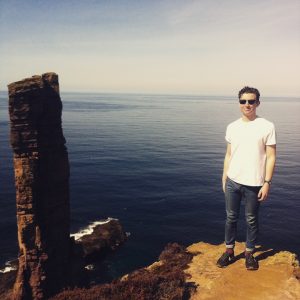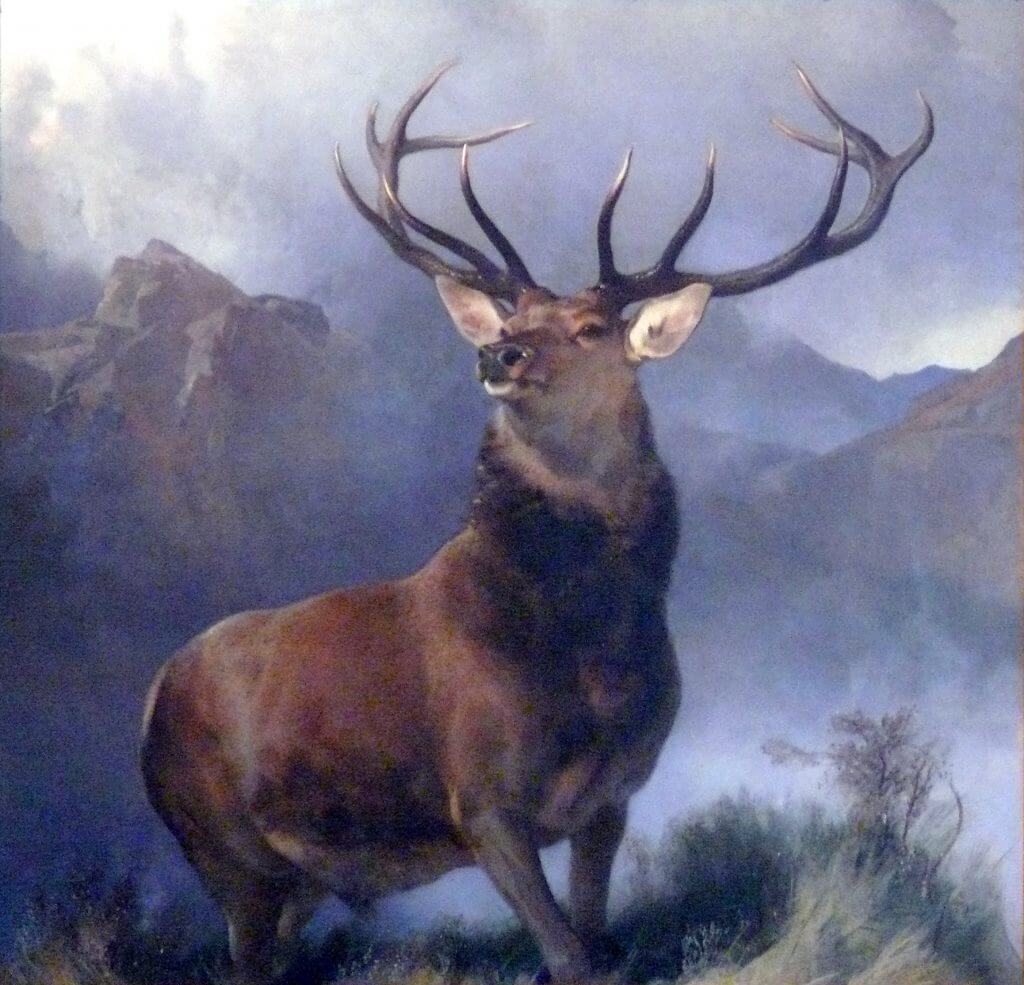 I am twenty-two years old and I am currently a bookseller in Waterstones having recently graduated with an English Literature degree from The University of Aberdeen. My interest in nature was sparked by visits to my Grandpa’s farm in Aberfeldy, Perthshire and an entirely spontaneous obsession with birds during my early years of high school. As much as I enjoy my job I hope that one day I’ll be writing books instead of selling them.
I am twenty-two years old and I am currently a bookseller in Waterstones having recently graduated with an English Literature degree from The University of Aberdeen. My interest in nature was sparked by visits to my Grandpa’s farm in Aberfeldy, Perthshire and an entirely spontaneous obsession with birds during my early years of high school. As much as I enjoy my job I hope that one day I’ll be writing books instead of selling them.
The Gralloch
Great tendrils of cloud uncoiled in the sky as our tribe set off into the forest. Following instructions we thrashed away with sticks and yelled whatever blind sounds came into our heads. What the trees must have thought of us: wellingtoned, Gore-Texed and occasionally bespectacled, all bundling through the woodland as dusk slowly seeped into night. We brought noise to a usually peaceful place; disturbance to ground rarely stepped upon. And while a group of shrieking aunties and branch brandishing children may not seem like a formidable force, to the creatures of the woodland we were unpredictable, dangerous, and deadly.
Usually we would have returned from the forest as empty handed as we had entered (excluding the occasional trinket, like the blue-barred jay feather that sits on a shelf in my grandparent’s bathroom). But that night was not a usual night. That night we were searching for something; something more likely to be stumbled upon than sought.
A whistle pierced through the tree line and reached the ears of my grandpa.
‘That’s Duncan everyone!’ he shouted. ‘He’s ready for us!’
With that our hollering increased. We kicked and swiped and howled ourselves into a pagan frenzy, all the while moving through the trees, flushing out whatever may have hidden there. Then, quick as a flash, a roebuck erupted from a thicket and bounded towards the edge of the wood, into the empty meadow.
Two shots rang out.
‘He’s got it’ said my grandpa, smiling. ‘He’s bloody got it!’
***
That was the first time I ever saw death; or rather, it was the first time I saw death as unbendingly visceral as I saw it that day. I had killed flies before, but I had never seen their eyes glaze over or blood weep from their mouths. Everyone stood around the carcass, suddenly emptied of the pagan mood. I could see how strong and agile the deer must have been while bouncing through the forest trying to escape us. The face had an innocent beauty to it and the faint sprouting of antlers testified to its youth. It was a teenager – about as mature as I was.
‘The gralloch’ my grandpa said, producing a small blade from his pocket and cutting into the deer’s taught belly. My brothers and I watched as the warm, pulsating entrails slopped out onto the grass. We poked the stomach with sticks and saw the strange mulch that sustained the young roebuck: a thick soup of grass and saplings.
‘See boys?’ said my grandpa, gesturing to the guts with a bloody hand. ‘That’s all my trees in there’
We carried the deer back to my grandparent’s house – emptied of its innards and swinging gently between the grips my grandpa and my uncle had on its legs. It was an archetypal scene, one that city-raised children like myself seldom witnessed: the setting sun, the hunter’s quarry, the trudge homeward towards shelter, fire and food. The land knew this ritual.
That night, as I ate a piece of the roebuck’s liver, I thought of how natural it seemed to be eating something that, less than an hour ago, had been a perfectly functioning part of an animal. It wasn’t an ignoble death; I knew that. The roebuck had spent its life much as a deer should: wild and elusive. Perhaps it had crossed a few motorways or leapt a few fences, but for the most part it had been left alone by humans; at least, so I thought.
In reality, the roebuck had led a most unnatural existence, one thoroughly dictated by the actions of my own species. It may have run wild across moors and glens, but this was still a cow of another order; a beast mangled into an abnormal world by the force of our will.
For the first time in my life I was eating an animal whose death I truly knew to be humane, or as humane as it could possibly have been. Still, there were forces far beyond the treeline that had led that deer to my plate; forces that cared not for its wildness, or its wellbeing, nor the taste of its flesh; men who saw deer only as icons that were capable of turning a profit. I did not know these things back then, yet I still felt something close to unease as my grandpa thanked everyone around the table.
‘You’ve helped save a good lot of my trees’ he said, biting down on a piece of liver.
‘…until the next one gets in’ my uncle added.
‘Yes…quite’ muttered my grandpa, pushing aside his empty plate. As he did so I could see the red blotches of deer blood still staining his calloused palms.
This was a problem deferred, not solved.
***
Edwin Landseer’s famous painting ‘The Monarch of the Glen’ is, for many, a far too saccharine image of Scotland. For the Victorians, however, it displayed the Scottish wilderness in all its glory – depicting the beauty of the landscape and the handsomeness of the brutes to be shot there. It is an image of Scotland that made it seem as if the Highlands had been un-touched by the environmental meddling that had occurred in the rest of the country. Landseer’s backdrop shows cloud-crowned mountains unblemished by the iron monstrosity of a coalmine or a factory. This is the beauty of the wild. This is nature at its best.
Only in hindsight do we see how unnatural an image this really is. Behind the stag Landseer paints almost nothing but empty space. This deer is monarch over a desolate land; a land shaped not by the forces of nature but by our own oppression of it. There may not be a factory, but the eerie absence of anything in Landseer’s background highlights a problem just as troubling as the fumes spewed by an ironworks.
Today, attempts to reinvigorate native woodlands are stunted by the rapacious grazing of deer, whose only current predator, ourselves, cannot control their numbers. And so the trees that are so desperately needed in a world of increasing climate change, ash dieback and habitat loss don’t stand a chance.
Yet despite knowing the solution to the problem of deer we continue to spout doubts about the introduction of apex predators. Gamekeepers fear a loss of profits. Farmers fear for their stock. Walkers fear a countryside stripped of its quaint sterility.
My uncle was right; more deer did get into my grandpa’s farm. So many, in fact, that their presence is almost continual. No amount of familial excursions into the forest can stem their flow.
Landseer’s depiction of empty glens and treeless horizons is quickly becoming a reality. Wolves and bears are insignificant fears in a land where trees cannot grow without the aid of a fence and a gun.
When I look back upon my first hunt, the image of the gralloch stays with me. But the fact of the roebuck’s death does not sadden me. Rather, the fact of its life – without predators, without thriving woodland – is far more worrisome. For what creature whose natural predators have been replaced by tweed spackled gentry-men and wellingtoned families can truly claim to be wild?
[registration_form]
Great piece of writing Ross. I have shared a very similar experience of deer driving and only a few miles away from yours.
It’s the way shooting is increasingly relying on a process of industrial land management that I abhor, not the fact of the hunt or the shot itself.
Thanks, Ross. And congratulations. Keep weaving those words and thoughts on rewilding.
Yes, that Landseer job is a bit sugary and silly. It’s also embarrassing at a national level. If Scotland had half decent wooded ecosystems in and above its glens (as per most of the rest of upland Europe) that stag would be a lot bigger.
“Quaint sterility” is a brilliant phrase that totally resonates with me, and the attitude of e.g. Nicholas Soames MP (Mid Sussex) (Con) at Monday’s BDGS debate – “if you cease burning, you get long, degenerate, rank heather, which is unsightly…” (https://goo.gl/NKirCJ)
Shifting baseline syndrome has gone well awry. I keep puzzling how to penetrate the dominionist dogma of shooters; will it expire with a generation or is it propagating itself?
Anyway, I thought you trod a careful path between recognising that killing single wild animals can be done ‘ethically’, for subsistence, and pointing out that when it becomes ‘protecting’ other species we favour, whether livestock or plants, it misses the bigger picture of absent apex predators.